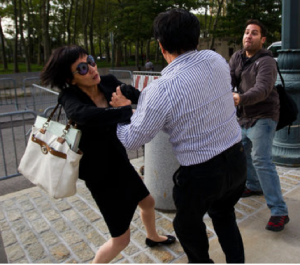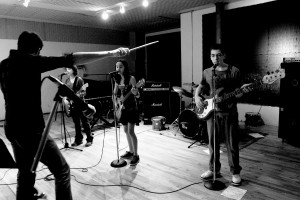
Astute DadWagon observers (there must be two or three of you by now) will have noticed that things have changed slightly around the site, both in recent weeks (we’ve been tweaking our design in anticipation of a bigger tweak) and over the now nearly two years of our existence.
God, two years! Can you believe it? It seems like just yesterday that we were… talking about the connection between sippy cups and impotence? the benefits of dirt? flirting with bartenders? I guess it’s not really that different from today.
One of the corollary effects of DadWagon’s senescence is that my daughter, Sasha, is now just about the age that Theodore’s JP and Nathan’s Dalia were when the blog launched. Which means I’m about to begin covering all of the subjects that those two have been maundering over since 2009. Awesome! And today’s subject is: universal pre-K!
Now, Nathan and Theodore have explored this quite thoroughly, with the former questioning whether 3-year-olds actually need an education, and the latter telling him he’s stupid. Between the two of them, I’m sure they’ve discussed everything I need to know now that Sasha is herself approaching the 3-year mark, but somehow, even though I read every word those dudes drunkenly typed up, none of it sank in.
Which is how I found myself, last week, at a pre-K/kindergarten workshop run by Joyce Szuflita, at some maternity-clothing shop on Court Street in Brooklyn. Frankly, the whole pre-K thing terrifies me: Somehow it feels like this is the first choice I’ll have to make for Sasha that will really start determining how she turns out as a person. I know that’s not entirely accurate, but the fear remains. At the same time, going into the workshop I was totally skeptical about the information I’d receive. After all, shouldn’t I be able to figure this stuff out myself, and not have to pay $25 for someone else to tell me?
And yet… dear readers, I learned! For example, I learned—at last!—the difference between Districts and Zones. I mean, these were terms I’d heard bandied about for years, but I didn’t realize they referred to different things. Now I know! And I guess I learned other things, too, although I’ve mostly forgotten them by now. Oh, right: gifted and talented. As Nathan remarked one whole year ago, G&T is evil. Or, maybe not evil, but strange: Preschoolers take an inane, inaccurate test of their intelligence/willingness-to-put-up-with-adults in order to get into an elite program featuring the same class sizes, same funding, and same curriculum as their ungifted-and-nontalented peers get.
The one real benefit, Ms. Szuflita said, is that the curriculum is more flexible. That is, if all the G&T kids can grasp fractions in a day or two (whereas their normal peers take weeks, if not months), then there’s more time for them to build an Indian sweat lodge. Um, okay.
In the end, the universal pre-K decision for me came down to one single thing: the school day is only six hours long, ending around 3 p.m. Since Jean works and I “work” too, this would not make things easy. We’d have to get a five-day-a-week babysitter, and the cost of that would probably just about equal what we pay to send Sasha to Preschool of America, which handles her from 8:30 to 5:30 and feeds her three meals a day (plus snack!). So, we’ll skip city pre-K, right?
Well, there’s one further complication: Joanna Fan, head of Preschool of America, was indicted and arrested about 10 days ago on charges she stole $2.5 million in federal funds. The money was supposed to be used for “nutritious meals for preschoolers” at the nonprofit Red Apple preschools, where she’s also executive director, but instead, the authorities allege, she and her husband, Ziming Shen, used “the money to make mortgage payments on several Manhattan condominiums and to benefit their private business interests, which include Preschool of America Inc., a chain of about a dozen for-profit preschools in Manhattan, Brooklyn and Queens.”
Here’s a bit more from the Times:
Audits by the New York State Health Department and the federal Agriculture Department since 2005 revealed a pattern of false submissions to the Agriculture Department, including lying about how many children were getting the meals, the complaint charges. For example, the complaint says, in January 2009, Ms. Fan submitted records claiming that 188 children had consumed 4,700 meals and snacks, when other records showed that 116 children ate 2,900 meals and snacks.
The complaint charges that in 2008, Ms. Fan issued a check for $200,000 from the federal lunch money account to make personal condominium payments, and also withdrew $110,000 to pay her personal income taxes. Between 2005 and 2010, the complaint asserts, $2.7 million went to Supermarnet, a company Mr. Shen owned, to provide meals to the preschoolers. But the complaint said invoices indicate the company spent only $24,000 for food during that period.
In all, according to the complaint, Ms. Fan stole approximately $1.8 million of program funds in 2008 and 2009. She acknowledged in a written statement to the Agriculture Department that she had taken the money, but stated that she had “borrowed” it, the complaint charged.
Okay, so how does a parent deal with this? There are two considerations, as far as I can tell. One is moral: Do we continue to support a school run by alleged thieves, a school where our daughter has allegedly benefited from funds meant for poorer children? Part of me is outraged here, but another part is shrugging its shoulders. (I guess that part is the shoulders.) I mean, what do you expect from mainland Chinese people? Give them money, and they’ll do what they want with it. And the school (at least Sasha’s branch) seems well-run: She loves the teachers and her classmates, and would be devastated if we suddenly switched schools. In other words, we have no stringent moral principles we abide by—whatever’s good for our kid is good for us. Fucking yuppies.
The other issue is more practical: If Joanna Fan and Zhiming Shen are forced to repay what they’ve stolen, how does that impact Sasha’s school? Would there be cutbacks? Tuition increases? Would teachers flee for more stable, less ethically compromised workplaces? Would some branches be closed entirely? Should we get Sasha into a pre-K program just as a backup?
The answer to that last question is, I think, yes. We’ll go through the whole rigamarole of visiting schools, applying to them, fretting over the G&T test, and maybe even arranging babysitters, even though in the end Preschool of America might go humming along and all this preparation might not matter at all.
At the very least, it’ll be good preparation for the real battle: getting into kindergarten.



